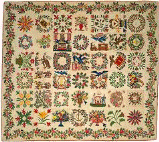Textile Society of America

Textile Society of America: Symposium Proceedings
Date of this Version
2000
Document Type
Article
Citation
In Approaching Textiles, Varying Viewpoints: Proceedings of the Seventh Biennial Symposium of the Textile Society of America, Santa Fe, New Mexico, 2000
Abstract
John Deely (1990) stated that "the whole of human experience .. .is an interpretive structure mediated and sustained by signs". The investigation of the role of signs in the sphere of textiles is, to use Deely's phrase, one of "semiotic consciousness" or the awareness of symbolic content in clothing, cloth and textile motifs.
Semiotics is the theoretical accounting for signs and what they do. It is the study of signs and sign-using behavior including semiosis or the action of signs. The action, which may be physical or psychological, takes place between two subjects that exist physically plus a third element that need not be an actual existing thing. For example, action may consist of the motif on a textile, a viewer and a psychological reaction on the part of the viewer.
The words sign and symbol are not synonymous. A sign is a mark, emblem or pictogram that conveys specific information in a direct and unambiguous manner. A symbol is a sign, device or image that represents one thing but means something else. A symbol derives meaning from those who use it.
A textile sign or symbol may be portrayed realistically (representatively) or in an abstract (simplified) style. A symbol can additionally be portrayed in a non-objective or nonrepresentational style. People who use the symbol in a cultural sense understand its meaning or implication regardless of how it is portrayed.


Comments
Copyright © 2000 by the author(s).